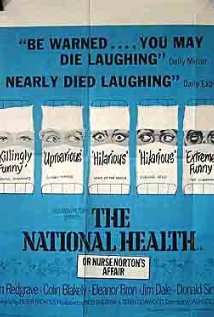Critical
Evening Standard said it has "fitted very well on to the big screen." [7] The Sunday Mirror called it "the best British film for ages." [8] The Observer called it "admirably unsentimental, compassionate and very funny." [9]
The Monthly Film Bulletin wrote: "The National Health is M.A.S.H. without the mayhem – an unsentimental, uncomfortably comic and barely exaggerated portrayal of British welfare medicine, the most well-meaning on earth, but dispiritingly undermanned, depersonalised, and bogged down in bedpans and logistics. "Here in England", observes Jim Dale's lugubrious ward orderly, "we have as high a standard of dying as anywhere in the free world". The only reminder, in fact, that the nearest one usually gets to this kind of comment is Carry On Nurse is the presence of Jim Dale, though that is meant to be far from disparaging: he all but steals the picture with his portrait of cheerfully cynical vulgarity, relishing Nichols' best lines ("One slip", he quips as he shaves a patient in preparation for an abdominal operation, "and Bob's your auntie!") and neatly rounding out the role with the cold sneer he gives to departing patients over whom he has affectionately fussed. The acting throughout is flawless, with perhaps the best moments provided by Clive Swift's basket-weaving ulcer victim, Colin Blakely's grumbling amnesiac, Lynn Redgrave's devoted, put-upon nurse, and Donald Sinden – in one of several double cameos – as a brash consultant ("Your bum any better ?") and soap opera surgeon ("To err is hooman")." [10]
Leslie Halliwell said: "Acerbic comedy from a National Theatre play which mixes tragedy and farce into a kind of Carry on Dying." [11]
The Radio Times Guide to Films gave the film 3/5 stars, writing: "Director Jack Gold assembles some sprightly set pieces and fine actors (Donald Sinden, Lynn Redgave, Jim Dale) who give real clout to the sometimes contrived satire." [12]
